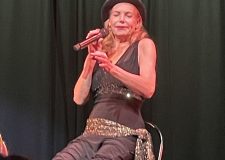Andrew Kay: Who Cares?

Recognising the needs of the unrecognised
I grew up in a fairly conventional family home, or at least I thought so. Until I was seven we lived with my grandparents in their three bedroom terraced house. It was in a smart but ordinary area and was a step up from the terraced northern homes that most southerners seem to think covered the harsh industrial landscape as it had a nice front garden. We were working class, close knit as a family and when we finally moved to our own newly built council house it seemed like we had moved to paradise.
Dad worked abroad quite a lot, which seemed glamorous, but only now do I see the pressure that put on Mum, left with only a tiny allowance on which to pay the rent and live. The rest of Dad’s wages were banked for him until his return – which Mum hated of course.
Mum had given up work to have and raise my younger brother and I, and as she was at home doing that my cousins tended to be around too. As if this were not enough, fate dealt her another blow when my grandmother fell off the platform of a moving bus and lost her sense of balance. Bed- and wheelchair-bound she needed full time care and this fell to Mum.
Each day she would get up, see us all off to school or work and then walk three miles to get her mother up and sorted, she would then walk back late afternoon to cook our tea only to do the same six mile round walk again to see her to bed. It was twelve miles a day six days a week; on Sundays my uncle did it.
The name for what mum did was – daughter! Yes, simply that. She was fulfilling a daughter’s duties and although much appreciated she was often taken for granted. This she did without complaint and without pay. For a short time towards the end of my grandmother’s life she did receive a small allowance for the work she did but it was a pittance, too little and far too late.
I recently heard about an excellent charity whose aim is to help people in a similar position, yes it still goes on. I asked for an update and this is what they had to say:
“The name for what mum did was – daughter! Yes, simply that”
‘Carers provide unpaid care by looking after an ill, frail or disabled family member, friend or partner. Unfortunately, lots of carers don’t see themselves as carers. According to a national survey, most carers will not realise they are carers until they have been caring after three years! The evidence identifies that unpaid care has increased at a faster pace than population growth between 2001 and 2011 in England and Wales. It is anticipated that the population of carers will rise to nearer 9 million by 2037, with every year two million people take on caring responsibilities.
‘The 2011 Census data shows that Brighton & Hove has 23,967 people who identify themselves as carers, which represents 9% of the population. Of those carers: 68% provide 1 to 19 hours of care a week; 12% provide 20 to 49 hours per week; and 20% provide 50 or more hours per week.
‘The economic value of the contribution made by carers in Brighton & Hove is £388.7million, an increase of £88milion (29%) from the 2007 estimate. The economic value of carers has increased for two main reasons. First, the costs of replacement care have increased from £14 per hour to £18 which is an increase of 24%. Secondly, the number of carers has gone up.
‘Based on national figures we may expect the following in Brighton & Hove:-
• Over 1,000 carers may sustain a physical injury through their caring role and over 1,000 may be treated for a stress related illness
• More than 4,500 carers have been caring for at least 10 years and almost 1,000 for five years or more
• Nearly 4,000 carers look after more than one person
Caring also has negative impacts on carers, such as health (both physically or mentally), finance, relationships and work. Experiencing anxiety, loneliness, isolation and having poor quality of life are very common to most carers.’
I read all this and realised more than ever what Mum had done, what she had lived through and how it had affected her. She was always tired of course, but the mental frustration she must have felt having given up an excellent job to look after us and never being able to return to work must have weighed heavy – in addition to all that walking, lifting and cleaning!
If you recognise yourself or perhaps a family member or friend in a similar situation then the Carers Centre website is full of excellent information and advice. If you would like to help there is information about that too. Reading through what they do and the massive age range of people who act as carers is moving and does make you realise how lucky we are to have close family and close friends.
To find out more go to www.thecarerscentre.org




















